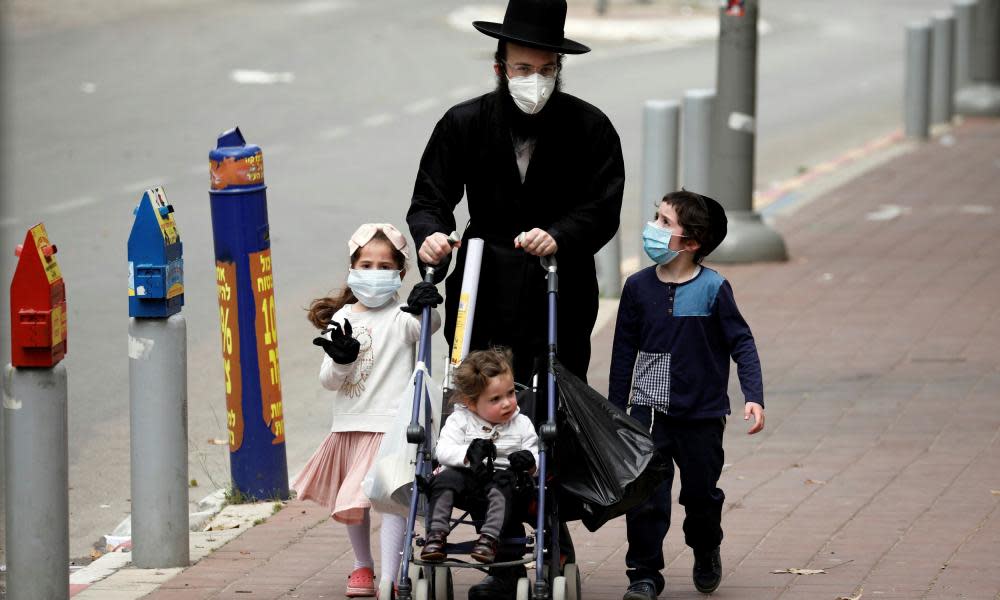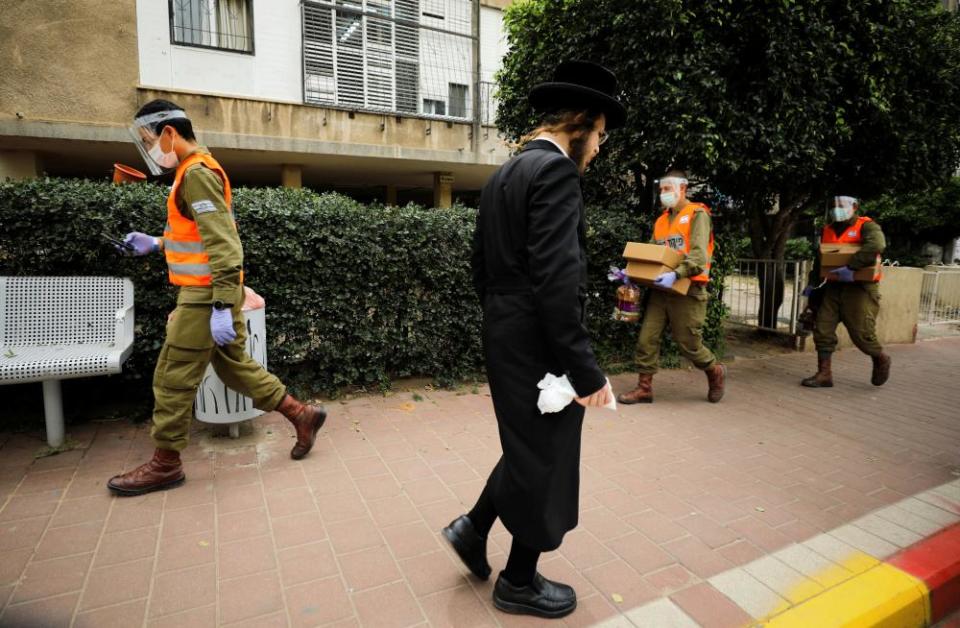Calls to seal off ultra-Orthodox areas add to Israel's virus tensions

It wasn’t a typical police operation. Two Israeli officers were to go undercover, although not posing as drug dealers or arms traffickers. For this particular assignment, they were to disguise themselves as ultra-Orthodox Jews.
Their mission on Friday was to bust an illegal gathering in a synagogue. People were praying together, a practice that is now against the law in the era of the coronavirus. Once the officers got inside to confirm the crowd, more units barged in and dispersed people.
Forces left the area, according to police, but: “An hour later, it was reported that people had returned again.” At that point, officers handed out fines amounting to nearly £4,000.
The operation in the county’s north was one small part of a sometimes fruitless nationwide effort to impose Covid-19 restrictions on a deeply religious and often cut-off community that has been slow, or even opposed, to change their way of life.

Officials fear the result has been an explosion of cases in neighbourhoods populated with the minority, which makes up more than 12% of Israel’s nine million citizens.
In the most extreme case, an entire city, Bnei Brak, has been surrounded with barricades. Israel’s cabinet declared the city a “restricted zone” last week, sending in 1,000 police officers who blocked residents from leaving except under special circumstances. The army has also be deployed to deliver food to the elderly.
One medical expert estimated up to 38% of Bnei Brak’s roughly 200,000 mostly ultra-Orthodox inhabitants could be infected, significantly higher than the national average.
Many Israeli ultra-Orthodox live in poor, often congested areas with large families where infections can spread rapidly. Some religious leaders have refused to order their people to stay inside long after the rest of the country was locking down.
When a population are told the Torah will protect them there is no motivation to comply with orders
Jessica Apple, Haaretz
Chaim Kanievsky, an influential rabbi, had initially refused to close packed synagogues and religious seminaries, where hundreds of boys and men gather daily. “The Torah protects and saves,” the 92-year-old said. Only in late March did the rabbi relent, calling for lone prayer.
There have also been several anecdotal reports that ultra-Orthodox communities in other countries, including the UK, are suffering an above-average infection rate.
In Israel, the outbreaks have deepened entrenched grievances between secular and religious populations that have festered since the state’s founding.
Ultra-Orthodox Israelis, known in Hebrew as Haredim, or “God-fearers”, occupy a unique role, with laws allowing them to avoid military draft and live off stipends while they study religion, leading to secular resentment.
Related: Jewish leaders fear ultra-Orthodox Jews have missed isolation message
Many abhor Israel’s interference in their traditions. Some are vehemently anti-Zionist, rejecting the country whose Jewish majority is mostly secular, which has frustrated government coronavirus efforts when public trust and obedience are vital.
Attempts by police to enforce quarantine restrictions in religious neighbourhoods of Jerusalem have led to sometimes violent standoffs. Paramedics have been hit with rocks.
“When a population that regards its religious leaders as infallible are told that the Torah will protect them and that the secular law enforcement agencies are Nazis and anti-Semites, there is no motivation to comply with orders,” wrote Jessica Apple in the progressive local Haaretz newspaper; her article also called for ultra-Orthodox jews to wear face masks.
Now the cabinet is discussing using the Bnei Brak lockdown as a model for other outbreaks, and local media have cited an unnamed health official as saying more ultra-Orthodox areas could also be sealed off.

Yehuda Meshi-Zahav, an ultra-Orthodox Jerusalemite who used to take part in anti-government demonstrations, said some rabbis took a “long time to internalise the severity of the situation … and they truly believe that studying Torah is more important than anything else.”
However, he said the government was also slow to communicate with more radical parts of the community, many of whom have no internet, television, radio, smartphones or even newspapers and usually get news from posters stuck to noticeboards.
Meshi-Zahav, who runs a volunteer emergency medicine group that has been helping coordinate the Covid-19 response, has written posters on the rules. Still, he added: “It is not our job, it should be the Ministry of Health’s responsibility.”
He said he was concerned about growing anger. “In normal times, there are discussions on this, but now the seculars are saying, ‘you are infecting us’. This is terrible, there is a lot of antisemitism around the world, and now the seculars are doing this?”
“There are things they say that are correct, but to accuse a whole community? To generalise? Some people are using the situation to attack the Haredim.”


